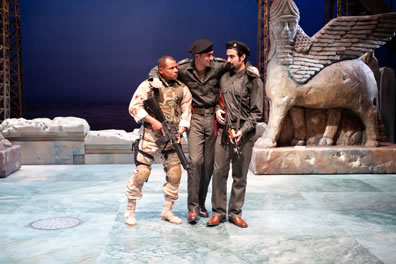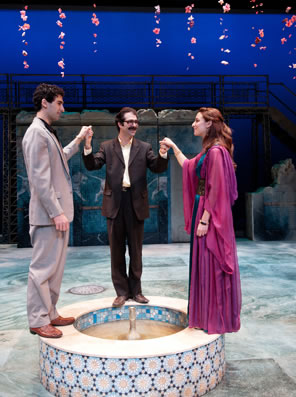Troilus and Cressida
Hoo-rah! Shakespeare's War-Soaked
Masterpiece Comes of Age
Oregon Shakespeare Festival, Elizabeth Stage/Allen Pavilion, Ashland, Ore.
Thursday, August 16, 2012, C–34&36 (front right corner, studio theater)
Directed by Rob Melrose
We'll likely never know what got into William Shakespeare when he decided to write Troilus and Cressida. After scoring commercial success with rom-coms ending in witty epilogues praising the audience and tragedies ending in dignified odes to the hero, Shakespeare wrote a play that defies category and ends in a diseased man threatening the audience with syphilis. Having pushed Elizabethan theater to its highest arc with Twelfth Night and Hamlet, he crafted a play that counters the conventions of his time but fits perfectly in our post-Brecht age.

From left, Diomedes (Kevin Kenerly), Paris (Ramiz Monsef) and Aeneas (Fajer Al-Kaisi) prepare to make the trade of Cressida for the prisoner Antenor in the Oregon Shakespeare Festival production of Troilus and Cressida. Photo Jenny Graham, Oregon Shakespeare Fesival.
Largely ignored for more than 300 years, Troilus and Cressida is emerging as a true Shakespearean masterpiece, and the Oregon Shakespeare Festival's version, setting the play in Operation Iraqi Freedom, firmly establishes that stature. Like The Deer Hunter, this play has no dramatic arc. Like The Sopranos, it has no tidy resolutions. Rather, it is a character study with some of the most sharply drawn characters in the canon conversing in some of the sharpest verse Shakespeare ever wrote.
Shakespeare's boldest stroke, though, was in how he portrayed the characters. Achilles, Ulysses, Agamemnon, Ajax, and Hector were mythological heroes for the Greeks, the Romans, and the Elizabethan English, too, yet Shakespeare drew them as petty, cynical, even cowardly. Such thinking about warrior heroes didn't gain wide traction until the latter half of the 20th century. Shakespeare wraps his version of Homer's Iliad around Chaucer's then-popular romance about Troilus and Cressida, but in recounting Cressida's betrayal of Troilus, Shakespeare mutes her motivation. Damned by the heartbroken Troilus and the nasty cynic Thersites, Cressida didn't earn much sympathy from audiences until the past 50 years when, in post-feminism times, the fate of women civilians caught up in war became more fully understood.
Troilus and Cressida has been labeled Shakespeare's anti-war play, his counterpoint to Henry V. But just as Henry V has passages condemning war's carnage, Troilus and Cressida proceeds in the footsteps of men who successfully argue for continuing the fight. The significant difference is the breadth and importance of the argument. Whereas Henry V skirts the question of why (that whole Salic Law speech by the Archbishop of Canterbury at the beginning of the play is all the justification), Troilus and Cressida sees both warring camps engaged in long discussions around that central question: What are we fighting for? Troilus and Cressida takes place in the seventh year of the Greek siege of Troy, and war weariness has set in on both sides. Both camps debate whether Helen's face is really worth the continuing loss of life and treasure. Certainly, to our 21st century sensibilities, such instigation for war is just silly, especially compared to something like the attacks on the Twin Towers in New York and the Pentagon. Yet, hardly seven years had passed since the terrorist attacks of 9/11 and the question of remaining in Afghanistan became an issue of the 2008 presidential campaign. No matter the reason to wage war, people through history seem to tire of the enterprise seven years on.
In setting his Troilus and Cressida in Iraq at the height of Operation Iraqi Freedom, director Bob Melrose portrays the Greeks as U.S. military members and the Trojans as Iraqi soldiers and businessmen. The battle uniforms and gear created by costume designer Christal Weatherly are remarkably accurate to the eyes of Sarah, my retired Air Force wife (her only complaint was that Agamemnon, played by Rex Young, seemed awfully young to be a four-star general), and Hector’s challenge being proclaimed throughout the Greek camps by the Stars & Stripes newspaper is a nice detail, too. Nevertheless, this production is not an update of Shakespeare's play, per se. As Troy was, historically, a Greek colony and the Trojans shared the same culture, Melrose's staging serves to accentuate the cultural divide between warring peoples superimposed on their shared humanity and principles. Despite the rap music and occasional hoorahs among the Greeks, the Islamic practices of the Trojans, and the drug use on both sides, this remains a text-centric production. We see the Trojan War of some 3,000 years ago and hear Shakespeare's lines written in the early 1600s played out by people we recognize from news accounts and Internet access or know as neighbors and colleagues. Sarah, for example, after watching Mark Murphey's gruff but cunningly common-sense Ulysses, identified him as a Marine general—and she's known quite a few.
Some audiences might read a political bent in portraying the Greeks (duplicitous Achilles, over-weaning Ajax, cowardly Thersites, scheming Ulysses) as Americans and the Trojans (dignified Hector, innocent romantic Troilus, royal Priam) as Iraqis. When, for example, Troilus warns Cressida that the Greeks are great seducers, I had to smile at the fact that these Greeks were U.S. service members and the inference, for me, of how American soldiers have notoriously romanced women in every theater in which they've been engaged. But you can't take such inferences too far: Shakespeare won't let you. He offers no right or wrong in this play, and all of his characters are shaded.

From left, Troilus (Raffi Barsoumian), Pandarus (Barzin Akhavan) and Cressida (Tala Ashe). Photo by Jenny Graham, Oregon Shakespeare Festival.
The noble romantic Troilus (Raffi Barsoumian) engages in premarital sex with Cressida (understudy Brittany Brook), which doesn’t separate him much from his wife-stealing brother, Paris (Ramiz Monsef). Cressida, of course, professes undying loyalty only to betray Troilus in her first test—but, man, what a test, stuck among the testosterone-fueled soldiers beseiging her city. Her uncle Pandarus (Barzin Akhavan) brings Troilus and Cressida together with the best of intentions for his niece and friend, but he does everything with a licentious leer. Cressida's father, Calchas (Bernard White) works in the employ of the Greeks (a la an interpreter), and he is the one who engineers the exchange of the Trojan Antenor, captured by the Greeks, for Cressida, who then becomes the property of Diomedes. Calchas is seen as a traitor by the Trojan Iraqis, but the American Greeks would regard his kind as heroes. We could denounce him as a terrible father for the arrangement he forces on his daughter, or we could commend him for getting his daughter to a safer place with greater career opportunities.
Diomedes (Kevin Kenerly) wants the sex, and he allows Cressida to be bandied about by the other Greek generals for kisses, but he also steps in as her protector. Ajax (Elijah Alexander) may be overproud and underintelligent, but he’s loyal and brave, too. Achilles (Peter Macon) may be duplicitous, but he’s devoted to those he loves. Thersites is a cowardly scab and, in Michael Elich’s intense rendering, a drug dealer and cokehead, but he functions as the play’s allowed fool, dispensing honest observations on the warriors and their war.
Hector (also played by Bernard White) may be dignified, but to a foolish extreme. Troilus chides him for “the vice of mercy,” Hector’s penchant for letting those he defeats go free, and this habit of his does end up getting him killed. Paris is a coke-snorting playboy prince fashioned after Saddam’s sons. And Helen? She may be gorgeous (and Brook Parks in a metallic gold bikini certainly is), but this spoiled lay-about would be willing to jump into the lap of any man with the wealth and inebriates to sate her many appetites. In Helen’s one scene, Shakespeare goes to great length to set her up against the image of Cressida, a native who Troy is about to give up to the Greeks (but they would never give Helen back). Interesting that time has been kinder to Helen than to Cressida, and Shakespeare seems to be questioning this tradition—after all, whose infidelity started the war?
We are invested in these characters not only because of this production’s Iraq War setting but also because the actors themselves are wholly invested in their roles. Every movement and expression is nuanced, every Shakespearean line delivered true to the verse and true to their American/Iraqi context, too. White turns in an extraordinary and intriguing performance as Hector, a portrait of stillness in dignity. His gray beard, lined face, and slight physique belie his fighting skills as he relies on his speed, agility, and mental acuity to overcome the brute Ajax and the daunting Achilles, both thrice Hector’s heft. Anchoring the ensemble is Barsoumian’s Troilus, a romantic soul yearning for a semblance of a normal life in a landscape under siege. Even though he questions the war’s validity, he fights on; even though he believes Cressida is unobtainable, he loves on. In the end, his sincere trust in honor and truth are swallowed up by his country’s political machinery and a war fought on behalf of an adulterous affair.
Eric Minton
August 21,2012
Comment: e-mail editorial@shakespeareances.com
Start a discussion in the Bardroom



 Find additional Shakespeareances
Find additional Shakespeareances